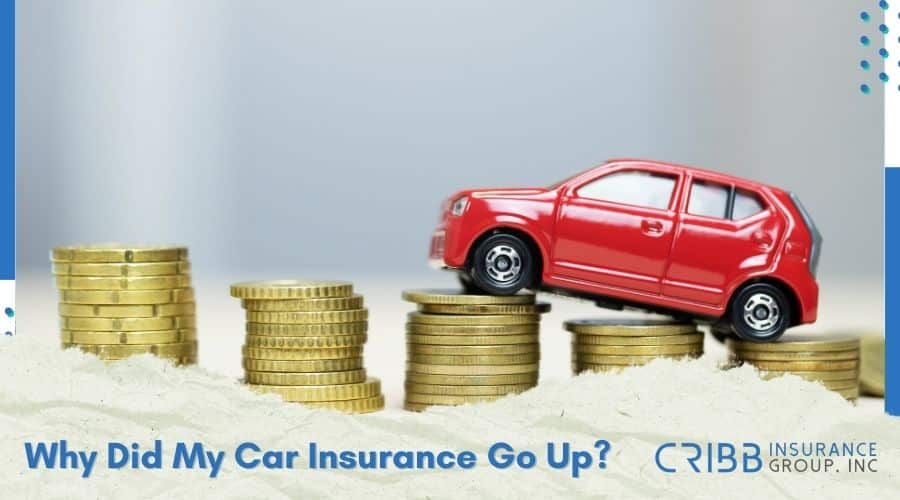Have you ever found yourself puzzled, asking, “Why did my car insurance go up?” You’re not alone. Many drivers experience increases in their car insurance premiums, and often, the reasons are not immediately apparent. In this section, we’ll uncover some of the most common factors that can lead to higher rates. Understanding these elements can help you better manage and reduce your car insurance costs, from changes in your circumstances to broader economic conditions.
Car insurance rates aren’t just numbers pulled out of thin air but are carefully calculated based on various risk factors. These include everything from your driving record to where you live and even how your credit score has changed. By diving into these details, you’ll gain insights into how insurance companies think and operate when determining what you pay. Let’s closely examine what could be driving up your car insurance premiums.

Key Factors Influencing Car Insurance Rates
Understanding the dynamic factors that influence car insurance rates can provide insights into why your premiums may fluctuate. This section delves into regulatory changes, your driving record, changes in your credit score, and the impact of age and driving experience on insurance costs.
Regulatory Changes
Regulatory changes can indeed have a profound effect on car insurance rates. However, it’s important to note that when state or federal laws evolve, insurance companies must adjust their policies to comply with new standards. This commitment to safety can sometimes lead to increased premiums, such as when new legislation requires higher minimum liability coverage. In such cases, insurance companies are compelled to raise rates to cover potential increases in claim payouts. This not only affects new policyholders but can also impact existing policies upon renewal.
Additionally, insurers may need to increase premiums to cover the costs of adapting their systems to new regulations. Understanding these changes can help consumers anticipate fluctuations in their insurance costs and explore options to mitigate impacts.
Your Driving Record
Your driving record is critical in assessing insurance premiums. A history of accidents, speeding tickets, or other traffic violations can significantly increase your rates, as these incidents suggest a higher risk of future claims. Insurance companies meticulously analyze your driving history to gauge risk potential; thus, maintaining a clean record can lower insurance costs.
Conversely, even a single traffic violation or accident can raise your premiums for several years. Defensive driving courses, safer driving habits, and technology aids like dash cams can help improve your driving record over time, potentially reducing your insurance rates.
Changes in Your Credit Score
Many insurers use credit scores to determine premiums, assuming financial responsibility correlates with driving behavior. A high credit score could indicate a lower risk of filing claims, leading to reduced insurance costs. Conversely, if your credit score drops, insurers might view this as an increase in risk and adjust your premiums upward.
Late payments, high credit card balances, and frequent applications can negatively impact your credit score. However, regularly monitoring your credit report and maintaining good financial habits can improve your credit score and, by extension, potentially lower your insurance rates.
Age and Experience of the Driver
Age and driving experience significantly influence car insurance rates. Young drivers, especially teenagers, typically face higher premiums due to their perceived inexperience and higher accident rates than older drivers. As drivers age and gain more experience, their premiums generally decrease, provided they maintain a clean driving record.
However, premiums can increase again for drivers in older age brackets, as they might face challenges such as slower reflexes and decreased driving ability. Each insurance company assesses age and experience differently, but understanding this factor can help drivers of all ages seek out the best rates possible for their situation.

Economic and Geographic Factors
Car insurance rates are shaped by personal factors and broader economic and geographic elements. This section covers how economic inflation and geographic location influence insurance premiums.
Effects of Economic Inflation
Inflation impacts almost every aspect of the economy, including car insurance. As the general cost of goods and services rises, so do the costs associated with car repairs and medical expenses related to accidents. Insurance companies must adjust their rates to ensure they can still cover claims under these new costs, which often leads to higher consumer premiums.
This economic factor is usually beyond individual control, but understanding it can help policyholders anticipate and understand changes in their insurance rates. Staying informed about economic trends and seeking advice from insurance professionals can provide strategies to mitigate the impact of inflation on insurance costs.
Geographic Location
Your geographic location plays a significant role in determining your car insurance premiums. With their high traffic volumes and greater likelihood of accidents and thefts, urban areas tend to have higher insurance rates. Conversely, rural areas might see lower premiums due to reduced risks of theft and collisions. However, rural areas may also face higher rates due to possible increased distances to medical facilities and repair shops, which can increase potential claim costs.
Local crime rates, weather patterns, and road conditions also impact geographic risk assessments. Understanding how your location impacts insurance rates can help you make informed decisions about coverage levels and potential ways to reduce costs.
Changes in Your Vehicle Situation
Changes to your vehicle or how frequently you use it can significantly affect your car insurance premiums. This section explores how upgrading to a new or more expensive car and increases in mileage can lead to changes in your insurance rates.
Upgrading to a New or More Expensive Car
Purchasing a new or more expensive car generally leads to higher insurance premiums. Newer models, especially luxury or high-performance vehicles, cost more to repair or replace, which can significantly increase the insurance cost.
Additionally, new cars may have advanced technology that is expensive to replace in the event of an accident or theft. When considering upgrading your vehicle, it’s important to consider how it will affect your insurance rates. Before making a purchase, it may be beneficial to consult with your insurance provider to understand the potential impacts on your premiums.
Increase in Mileage
Increasing the distance you drive annually can raise your car insurance premiums. Higher mileage increases the likelihood of being involved in an accident, thus increasing your risk profile with insurers. If your lifestyle or job changes lead to more time on the road, it’s important to notify your insurer, as this could adjust your rates.
Conversely, if you are driving less than before, you might qualify for a reduced rate. Insurers often provide options for low-mileage discounts for drivers who use their vehicles infrequently, which can lead to significant savings on premiums.
These detailed sections are intended to provide a thorough understanding of the various factors that can influence your car insurance rates, equipping you with the knowledge to navigate the complexities of car insurance effectively.

How to Manage and Reduce Your Car Insurance Premiums
While increases in car insurance premiums can sometimes seem inevitable, there are several strategies you can employ to manage and reduce these costs. Understanding your options and being proactive can help you secure better rates and more favorable terms. In this section, we’ll discuss various effective methods to keep your car insurance premiums in check, starting with how you can shop around for the best rates.
Shopping for Better Rates
Finding the best insurance rates doesn’t have to be daunting. Here are some practical steps to ensure you’re getting the most competitive pricing:
Compare Multiple Quotes: Always get quotes from several insurance providers. Prices can vary significantly from one company to another.
Check for Discounts: Ask about discounts for which you may be eligible. Many insurers offer reductions for good driving records, multiple vehicles on one policy, or even being a loyal customer.
- Consider Insurance Bundling. Bundling your car insurance with other policies (like home insurance) can often lower overall premiums.
- Review Your Coverage Annually: Your needs can change, so ensure your insurance does too. Reviewing your policy helps you adjust coverage as necessary and reminds you to shop for better rates.
- Opt for Higher Deductibles: Choosing a higher deductible can lower your premium costs, but make sure you can afford the deductible in case of a claim.
- Improve Your Credit Score: Since a higher credit score can lead to lower rates, boost your score by paying bills on time and reducing debt.
- Drive Safely and Responsibly: Maintaining a clean driving record is one of the best ways to keep your insurance rates low.
By following these tips, you can be more proactive about managing your car insurance expenses and ensure you pay only what is necessary.
Improving Your Driving Record
A clean driving record is a powerful tool for reducing car insurance premiums. Every incident-free year can lower your risk profile and, as a result, your insurance costs. Here’s how you can improve your driving record:
- Avoid Incidents: The simplest and most effective way to maintain a clean driving record is by driving safely and responsibly. Avoiding speeding, following traffic laws, and staying vigilant on the road can drastically reduce your chances of accidents and traffic violations.
- Take a Defensive Driving Course: Many insurance companies offer discounts to drivers who complete an approved defensive driving course. Besides the discount, these courses can make you a safer driver.
- Monitor Your Driving: Some insurance companies offer telematic devices that monitor your driving behavior. Safe driving as recorded by these devices can lead to lower rates.
- Address Tickets and Fines Promptly: If you receive a ticket, handle it promptly. Attending a traffic school, where available, can sometimes prevent points from being added to your driving record, which can keep your insurance rates from rising.
By focusing on these aspects, you can actively contribute to maintaining a spotless driving record, which keeps you safe and significantly reduces your insurance costs.
Other Discounts and Savings
Besides improving your driving record, there are other discounts and savings opportunities that you can leverage to reduce your car insurance premiums:
- Multi-Vehicle Discount: If you insure more than one car with the same company, you might qualify for a multi-vehicle discount.
- Safe Driver Discount: Demonstrating a history of safe driving over several years can qualify you for additional savings.
- Low Mileage Discount: If you drive less than the average number of miles per year, you might qualify for a low mileage discount.
- Student Discounts: Full-time students with good academic records often qualify for discounts.
- Anti-Theft Devices: Installing anti-theft devices in your vehicle can lower the risk of theft and vandalism, reducing premiums.
- Pay Annually Instead of Monthly: Some insurers offer discounts to customers who pay their yearly premium in one lump sum instead of monthly installments.
- Loyalty Discounts: Staying with the same insurance provider for several years can earn you a loyalty discount.
Exploring and discussing these discounts with your insurance provider can lead to significant savings, making your car insurance more affordable.
How Policy Adjustments Affect Premiums
Adjusting the details of your car insurance policy can significantly impact your premiums. Whether adding more coverage or removing certain features, each change can either increase or decrease the cost. Understanding how these adjustments affect your premiums is key to tailoring your insurance policy to your needs and budget. Let’s examine some standard policy adjustments and their implications.
Adding or Removing Coverage
When you tweak the coverage levels in your insurance policy, you directly affect how much you’ll pay in premiums. Here’s what you need to consider:
- Adding Comprehensive or Collision Coverage: While these additions provide broader protection against theft, natural disasters, and accidents, they will increase your premium. Consider whether the value of your car and the likelihood of such incidents justify the extra cost.
- Removing Unnecessary Coverage: If your car is older, you might drop collision or comprehensive coverage, especially if your vehicle’s value is low. This can significantly reduce your premiums, but you should assess if the potential out-of-pocket costs in the event of an accident would be manageable.
- Adjusting Your Deductible: Increasing your deductible, the amount you pay out of pocket for a claim before your insurance kicks in, can lower your premiums. However, make sure the deductible is an amount you can afford if you need to make a claim.
- Adding Roadside Assistance or Rental Reimbursement: These additional coverages can be useful but will increase your premium. Evaluate how often you need these services against the additional cost.
- Tailoring for Personal Injury Protection (PIP): Depending on where you live, you might need or want to adjust your PIP coverage, which can also affect your premiums.
Each of these decisions should be made with a clear understanding of your driving habits, financial situation, and the specific risks you face. Adjusting your coverage wisely can ensure you’re not overpaying for insurance while keeping yourself adequately protected.
Impact of Deductible Changes
Choosing the right deductible is crucial to managing your car insurance premiums. A deductible is the amount you agree to pay out of pocket when you claim before your insurance coverage starts paying. Here’s how changes to your deductible can affect your insurance costs:
- Increasing Your Deductible: By opting for a higher deductible, you take on more risk, which usually lowers your monthly premiums. This can be a smart move if you are confident in your driving skills and typically don’t make many claims. However, it’s important to ensure you can afford the higher deductible in case of an accident.
- Decreasing Your Deductible: If you prefer to pay a higher premium for lower out-of-pocket costs during a claim, lowering your deductible is the way to go. This might be suitable for drivers who want peace of mind knowing they won’t have to come up with a large sum of money when something goes wrong.
- Balancing Risk and Reward: The key to selecting the right deductible is balancing your comfort with risk against your financial situation. Analyze your past claim history and current financial health to make an informed decision that will not strain your finances.
Adjusting your deductible is a direct way to influence how much you pay in premiums, and it allows you to tailor your policy to fit your financial strategy.
The Role of Claim History
Your claim history is a significant factor in determining your car insurance rates. Insurers look at how often you’ve made claims in the past to gauge the likelihood that you’ll make future claims. Here’s how your claim history might impact your insurance costs:
- Frequent Claims: If you have a history of making frequent claims, insurers might see you as a high-risk driver, which can increase your premiums. This includes claims for accidents where you were at fault and multiple minor claims like windshield repairs.
- Type of Claims Made: The nature of the claims you’ve filed also matters. Claims for significant accidents or theft can substantially impact your premiums more than smaller, less costly claims.
- No-Claim Bonus: Many insurance companies offer a no-claim bonus or discount for each year you don’t file a claim. Maintaining a clean claim record can significantly reduce your premiums over time.
- Managing Your Claim History: Being judicious about when to file a claim can help you manage your premiums. For minor damages close to your deductible amount, paying out of pocket might be financially wiser than filing a claim.
Understanding the role of claim history and how it affects your insurance rates can guide you in making strategic decisions about when to file claims and how to manage potential risks.

Securing Your Financial Future with Cribb Insurance Group Inc
Navigating the intricacies of car insurance premiums can often feel overwhelming, but understanding the various factors that influence these costs is crucial for any car owner. From keeping abreast of regulatory changes and maintaining a clean driving record to managing your vehicle situation and adjusting your coverage options, each decision plays a pivotal role in shaping your insurance expenses.
At Cribb Insurance Group Inc in Bentonville, AR, we understand that every driver’s situation is unique. Our team is dedicated to providing personalized advice that aligns with your needs and financial goals. With a deep understanding of the factors affecting car insurance rates, we help our clients make informed decisions that contribute to their long-term financial security.
Remember, car insurance isn’t just a legal requirement; it’s a critical component of your financial well-being. By choosing the right coverage, adjusting your policy to suit changing life circumstances, and working with a trusted advisor like Cribb Insurance Group Inc, you can ensure that you’re both well-protected and financially savvy.
Frequently Asked Questions
Why does my car insurance go up even though I haven’t filed any claims?
Even if you haven’t filed any claims, your insurance might still increase due to broader factors like statewide regulatory changes, increased crime rates in your area, or general economic inflation. Insurance companies periodically adjust their rates based on the overall risk and costs associated with coverage.
Can changes in my address affect my car insurance rates?
Yes, moving to a new address can affect your car insurance rates. Your premiums might increase if you move to an area with higher crime rates or more frequent accidents. Conversely, relocating to a safer or less congested area could lower your rates.
How does adding a new driver to my policy impact insurance costs?
Adding a new driver, especially a young or inexperienced, can increase your car insurance premiums. Young drivers are generally considered at higher risk due to their lack of driving experience, which can lead to more claims.
Are older cars cheaper to insure?
Generally, older cars are cheaper to insure than newer ones because they have lower replacement costs. However, if your older car is considered a classic or has expensive parts, it might cost more to insure. Also, older cars lacking modern safety features might carry higher liability rates.
What is the best way to lower my car insurance after it has increased?
Generally, older cars are cheaper to insure than newer ones because they have lower replacement costs. However, if your older car is considered a classic or has expensive parts, it might cost more to insure. Also, older cars needing modern safety features might carry higher liability rates.
Ready to Optimize Your Car Insurance? Contact Us Today!
If you’re looking to better understand and manage your car insurance premiums, we’re here to help. At Cribb Insurance Group Inc, we offer personalized advice to match your specific needs. Reach out today to secure coverage that protects your vehicle and fits your budget.





